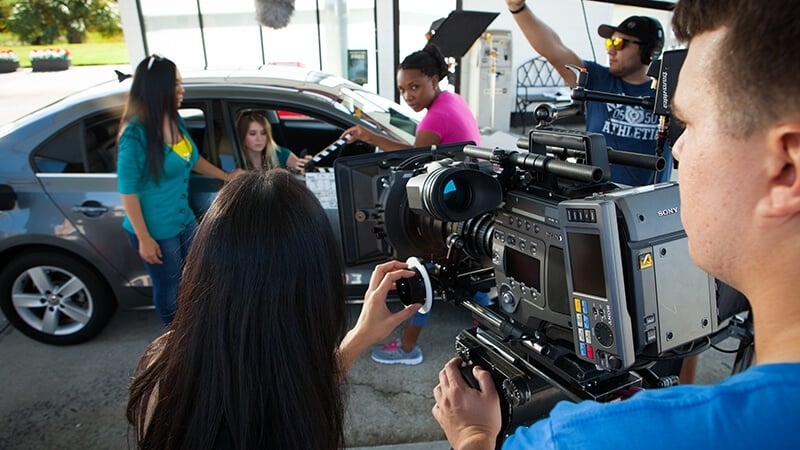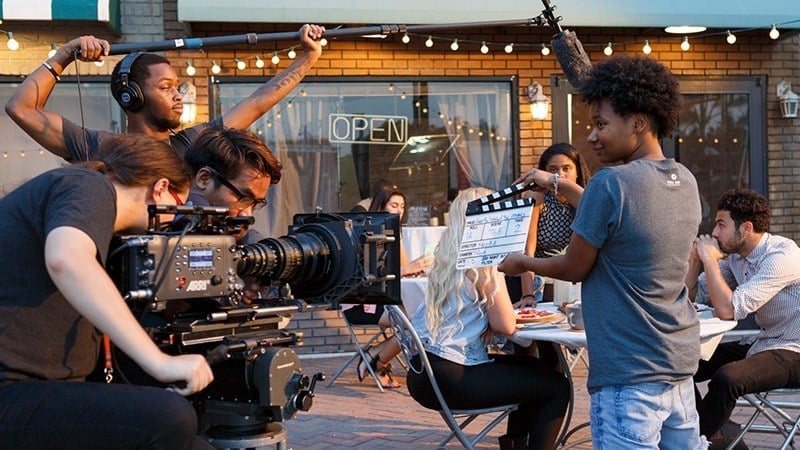Career Information
Key Careers in Film: A Beginner's Guide
The options for careers in filmmaking may be more varied than you think, and include many different types of roles on different kinds of productions. Whether it's a major Hollywood blockbuster or a music video, every production needs people to make it happen. When looking into the career positions available in filmmaking, the options range from the incredibly creative to the fiercely analytical. Finding out where you think you'll make the greatest impact is the first step in your professional journey.
Knowing there are so many options can be overwhelming, but this guide should help you get started in understanding the different roles you can aspire to within filmmaking, like:
- Writing
- Directing
- Producing
- Cinematography
- Sound Design
- Editing
- Art Direction/Production Design
- Makeup and Hair
Where would a film be without a script? Likely non-existent. This is why writers in the film industry are such an important part of the production process. Screenwriters are often the first pulse of a film's production, but they rarely see the process through to its final stages.
To become a writer in the film industry, it is imperative to be not only creative and a great storyteller, but you must also have a realistic understanding of the industry you're entering. A script may see several changes from a writer's initial pitch to its final delivery to the public. Practicing with scriptwriting, world-building, and character development are just some of the ways you can enhance your skills as a writer for film.
Often considered the most coveted position in film, the director's chair is by no means an easy one to fill. As a director in the film industry, you are responsible for the production's overall vision, necessary staffing adjustments (like choosing your Director of Photography and other key roles), and potential script changes, along with creative and technical direction over the course of a film's entire production.
As a director, you should not only be a technical expert when it comes to cameras, lighting, grip (building the technical aspects of a set), and audio but you should also be well-informed on film techniques like framing how a subject looks in a shot or the inclusion of special effects. A sense of creativity and artistic talents are beneficial traits for any director, though organization and the ability to delegate are must-haves.
While the writer and director shape the artistic direction of a film, it is up to the producer to manage its logistical side. When it comes to producing a film, the producer oversees almost every aspect of a film's creation. As a producer, you are responsible not only for budgeting, hiring key roles, and determining timelines, but also ensuring the film's creation is running smoothly from start to finish.
In order to be an efficient and successful producer, it is imperative that you are tenacious, well-organized, business-savvy, and understand the production of a film from every angle. Having this knowledge ensures that the producer can identify any potential roadblocks and redirect the course to get the production back on track. Spending time on a set and engaging in all of the various components that bring a film to life is a great way to figure out if this is the right career path for you.
A cinematographer is often referred to on a set as the Director of Photography (DP) and has a crucial role in the creation of a film. It is up to the DP to determine the appropriate camera, lens, and lighting needed for any given scene. In making these types of decisions, the cinematographer is able to manipulate the mood of a scene and the overarching visual feeling provided by a film.
To be a successful cinematographer, you must have expertise in lighting a set, camera operation, color theory (something you might recall from the color wheel in art class), and industry-standard cinematography techniques like wide or medium shots, close-ups, and extreme long shots.
Though sound is something unseen, it has the power to make or break the quality of a film. Sound designers on a film must ensure that every aspect of the audio track reflects the intentions of the director. Sound design encompasses every piece of audio in a film from dialogue and sound effects to the final mix of the film's audio track.
To become a sound designer in film, you must attain proficiency in audio recording and editing, understand acoustics and audio manipulation, and be a highly organized individual in order to manage the wide variety of aspects that go into a film's final mix. Having a well-trained ear is also integral to having a career in sound design. Apprenticeships in sound design and mixing are a required first step in this field and will provide you with adequate hands-on experience to enhance your audio skillset.
A film's editor may not spend any time on the set, but that doesn't diminish the importance of their role in the world of film. Editors are masters at crafting the story and establishing continuity, and they are entrusted to make recommendations for scenes/shots to be added or removed to improve the quality of the film's story.
As an editor in film, you must be familiar with many visual disciplines like photography, color theory, and exposure. Requirements include proficiency in editing suites such as Avid and Adobe Premiere along with the ability to implement visual effects (VFX) in the post-production process. Success in the editing room means a commitment to long hours and massive amounts of screen time.
Nothing makes a film more believable than the attention to detail provided by art directors and production designers. These roles demand the ability to communicate a theme/setting/mood through set dressing, scenery, and location along with a commitment to maintaining the overall aesthetic for a production.
As an art director or production designer, you must have the ability to take even the most outlandish dreams and fantasies set forth by a director or writer and make them tangible. Incredible creativity, artistic skills like drawing and painting, and proficiency in interior and exterior design are musts when pursuing this career path.
Hair and makeup artists in film are responsible for the looks of all onscreen talent. These individuals must ensure the subjects are accurate representations of the characters they are portraying. Their final product must align with the intended time period, the personality of the character, and even the weather taking place in the scene.
From period pieces to futuristic dramas, the varying looks that occur on a film set require you to be highly skilled in these art forms. The ability to create practical effects through hair, makeup, and prosthetic application are major requirements for a successful career in this field. Like any artistically focused career, practice with these technical art forms is the best way to enhance your abilities.
If you're interested in pursuing one of these roles and would like to learn more about where they fit into the film industry, we've also put together a handy guide to the different types of filmmaking career areas.
Want to learn more? Explore our film and television degree programs.
Whether you’re ready to apply or just want to learn more about Full Sail University, our Admissions Representatives are here to help. Call us or request more information.
Keep Exploring
- Web Design & Development
- For Parents
- Game Development
- International
- Graphic Design
- Music Business
- Creative Writing
- GRAMMYs
- Course Info
- Students & Faculty
- Game Design
- Industry Partners
- Business Intelligence
- Music Production
- Media Design
- Interactive
- Behind the Scenes Tour
- Sports Marketing & Media
- Government
- Admissions
- Film & Television

